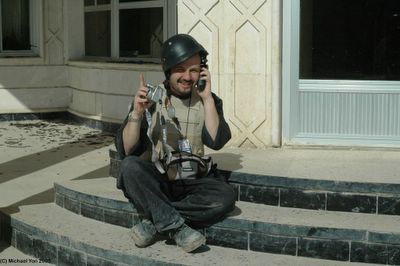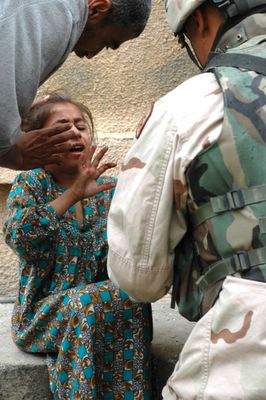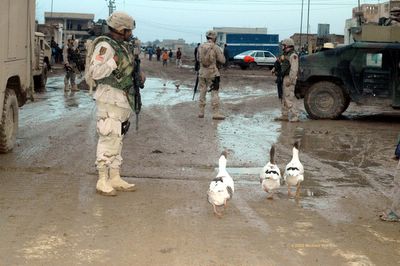And now, for the rest of the story....
Mosul, Northern Iraq
The media is an industry; but their business is not to report news. The industry needs a captive audience to beat the bottom line. The product is advertisement.
This is not a right or wrong. It's just a business concept for moving merchandise, and every profession or industry has one. Doctors, soldiers, preachers, lawyers, journalists: everyone needs to earn a living. Only a reclusive holy man might argue otherwise, but most holy men also expect alms.
There are probably many reasons why violent acts get more attention than do acts of kindness. All of these reasons fit somewhere under the heading of human nature. Any person rummaging around in his or her own head while asking the simple question, "What do I find interesting?" is bound to find a few garish relics. Sex and someone else's bad news will sell.
Finding or generating news can be costly. A good businessperson buys cheap, sells high. These points are obvious, but less conspicuous is how the media squeezes news cheaply from Iraq.
Now to our correspondent in the field...
Tailoring Facts to Fit Expectations. Frantisek Sulc, a Czech journalist for Lidove Noviny, told me the BBC did not believe it when he reported that American troop morale was high. They were concerned he was making friends with soldiers.
The formula followed by foreign (non-Iraqi) journalists here is different than that used by the local papers back home. Western media cannot free-range Iraq, asking questions and jotting answers on notepads, particularly where insurgents cut off the heads of anyone they do not agree with, later posting "news" videos of their own. Here in Iraq, where bullets are often the background noise, most news agencies get their daily facts spoon-fed straight from the military. The basic building block for just about any news item reported in mainstream press is something called a SIGACT.
SIGACTs are Significant Actions; anything that significantly affects friendly or enemy forces, from sandstorms to IEDs. SIGACTs originate at the smaller units and feed to higher units quickly; sometimes in seconds. If a soldier dies on a dusty street in Mosul, his HQ on FOB Marez might know within seconds, and soon his higher HQ, then various HQs in Baghdad will learn. People at Central Command in Tampa might get the news moments later, as will the Pentagon in Washington. Good or bad, information travels faster than bullets. In fact, SIGACTs travel faster than bullets every minute of the day.
Public Affairs Offices (PAO) are like news bureaus for the military, constantly taking SIGACTs and translating them into unclassified press bulletins called "media releases." Here in Mosul, I see the SIGACTs as they come in, or am with the soldiers on the ground where SIGACTs grow. But journalists settled in places like Tikrit or Baghdad rely on the PAO for printed media releases. Once in hand, the "news" can be broadcast or posted on the internet in minutes.
There are no PAO officers at Deuce-Four in Mosul. This is a combat unit. They have a gym, and a place to eat. Yet, a consequence of these media releases is that they allow the press to appear omnipresent on the battlefield, when in fact they usually stay close to the Green Zone in Baghdad. Reporters in places like Miami or Flagstaff also scan the stream of media releases on official military information websites. They can report "news just into our station" as if they had a live feed. Satellite communication has made this speed and sleight of hand possible.
Sometimes service members die and the news is reported around the world before his or her buddies on base find out. I've seen news of car bombs being reported before the mushroom cloud drifted away. Many journalists carry satellite equipment allowing live video and nearly instantaneous photo up-links, transmissions which can also include grid coordinates to the location of the camera.
If it bleeds, it leads...
If US forces are killed or wounded, the SIGACT might start like this:
Blam, Blam, Blam!...explosions…followed by a roar of small arms. So many weapons firing from so many directions, tracers bouncing off roads, zinging off buildings, rooms exploding, dust and smoke, a soldier cries out, "I'm hit!" and his buddies run across a road to help him and another is shot, "I'm hit!"
Then someone makes the radio call:
"Deuce-Main, Apache-Six, Contact, over." [Deuce-Four headquarters, this is the Alpha Company Commander]
"Apache-Six, Deuce-Main, send it."
"This is Apache-Six. Heavy small-arms and RPGs vicinity 4-West. Three friendly casualties, one is litter-urgent. Still in contact. We are in pursuit trying not to lose contact. Estimate 25 AIF [insurgents], all dismounted. Request QRF, over."
"Apache-Six, Deuce-Main, QRF spinning up. Warmonger is en route and fast movers in vicinity. Bulldog Company has a platoon two kilometers west en route to you. They are under your control time now. Don’t let the AIF break contact. Over."
"Roger, at least four enemy KIA. All Apache elements remain in contact and we have them isolated in a four-block area, over."
"Apache-Six, Deuce-Main, keep up the good work, don't let them get away. More combat power is on the way to assist in isolation."
"Deuce-Main, Apache-Six, roger, out."
Within seconds, someone will be typing up a SIGACT that might look like this:
SECRET
TACREP: XXXX
Subject: Smalls Arms Engagement
Time/Date: 2120 L 24 May 05
Narrative: Alpha Company 1-24 INF reports small arms and RPG, vicinity…. Reports 3 friendly WIA (1 litter-urgent, 2 routine). 4 Enemy KIA...
When this SIGACT is translated by a PAO, this might come out: "3 US soldiers were wounded by small arms in Mosul, Iraq. The soldiers were assigned to Task Force Freedom." News agencies that call or request information will get some variation of this report.
Such reports flow from all over Iraq to a place in Baghdad called the CPIC (Combined Press Information Center). The CPIC is like the Uber-PAO for Iraq, serving all branches of the military, and other nations in the Coalition. The CPIC collects those reports and makes a release that might go like this:
"3 US soldiers were wounded in a small arms engagement in Mosul. 3 US soldiers from Task Force Baghdad were wounded by a car bomb in Baquba while conducting convoy operations in Diyala Province. 1 US soldier was slightly wounded by an IED while conducting combat operations in Baghdad. 2 US Marines were killed in a Humvee accident in Anbar Province. A Blackhawk helicopter made an emergency landing near Ramadi. No injuries were reported."
This will hit pages all over the world, but in a newsier voice:
"A US helicopter made an emergency landing near Ramadi under unknown circumstances. An insurgent website claiming affiliation to Al Qaeda in Iraq says they shot down the helicopter with a surface-to-air missile. A US military spokesman would not comment. Elsewhere, one US soldier and two Marines were killed and seven other service members were wounded in Iraq, along with at least 18 deaths from a suicide car-bomber near the Syrian border. This brings total Coalition deaths in Iraq to 1,800. In other news, photos of the former dictator of Iraq in his underwear have infuriated the Arab world and angered the Pentagon, which promised a full investigation…"

Not Newsworthy: This medic's attention was significant for this little girl after a car bomb in Mosul, but it didn't make the SIGACTs or media releases.
But news of a baby girl with a circulatory condition who needed surgery getting medical help from U.S. soldiers and a concerned nurse did not become a SIGACT, nor will it be included in a media release. So, unless a reporter was embedded with that unit at that time--and decides to tell the story--no one will ever know this one small, but powerfully important detail. There are a thousand such details falling like trees in a forest, but no one is listening for those kinds of sounds.
I write about them when I can, but there's an irony to all of this that is hard to escape. Most of the acts of kindness I witness are done from an instinctive altruism that almost always seeks anonymity. And there is that other problem with catching people doing good--the cynical media is quick to ascribe cheap motivations to soldiers who reveal their humanity through their decency. And does anyone really care about the soldiers who, after having arrested a suspected insurgent, then spent the next twenty minutes trying to find a home for the two little puppies he was keeping?
Soldier and puppy .
Tonight, we bring you an exclusive investigative report...
From a media executive's perspective, where the CFO can occupy the same tier on the organizational chart as the managing editor, the math is easy: send a dozen journalists to Iraq, or hire one cheaply to live in Baghdad. The media gets a bargain rate on instant credibility from their "embedded journalist in the heart of the Sunni Triangle," who spends a few minutes a day paraphrasing media releases, then heads downstairs for a beer at the hotel bar.
Investigating Firsthand: Ducks look like ducks.
When real reporters really want to know something, they could teach the CIA a thing or two about digging up the facts. Having learned valuable lessons about being open--more or less--the military operates under the principle that by giving the press something, they have a fighting chance of getting their side of the story into the news stream. Yet, daily, when those SIGACTs are reduced into media-friendly releases, some have to wonder if they weren't very careful about what they wished for, because the easiest news to tell, in that 30-second summary, is a body count.
Reporting on special assignment from the front lines is...
Then there are the semi-embedded journalists, who normally come to a unit for only a few days, generally for two main reasons: either it's time for a report on hometown units, or something big is happening. During events such as the Iraqi elections, a swarm of media stars descended. The log-jam tied up more than teletype traffic. There's never enough space on helicopters, since the military tends to allocate resources based on combat considerations, not column inches.
The military selects even-keeled people to work as PAOs. Incredibly, I have yet to see one lose his or her temper. Yet, they must be tempted. Like the time I saw a producer from a major network arguing aggressively for helicopter space while trying to exclude representatives from other media, in order to maintain the "exclusive." Maybe because smart military officers know that kicking large media is like kicking landmines, especially when millions of people will see the broadcast, the PAO kept his cool, and kept the field level, more or less.
Cynicism aside, the media really is important to this war. Not only is this a war for public opinion, at home and abroad, but also, people's lives are won and lost every day in Iraq as a direct result of how the media uses its cameras and keyboards. Iraq is extremely dangerous. There are relatively few reporters here, and those here cannot operate as if it were "business as usual." The military makes it easy for journalists to nibble at facts and then dash back to their desks. Nobody is well-served by this arrangement; the media could still sell advertisement without stirring and blowing new life onto dimming brimstone.
Yet, finally, the ultimate decision-maker is the person reading or watching the news. We cannot expect mainstream media to give quality reporting if we accept drive-through service every night.
[Please join the private mailing list for notifications of important dispatches. ]
<< Home